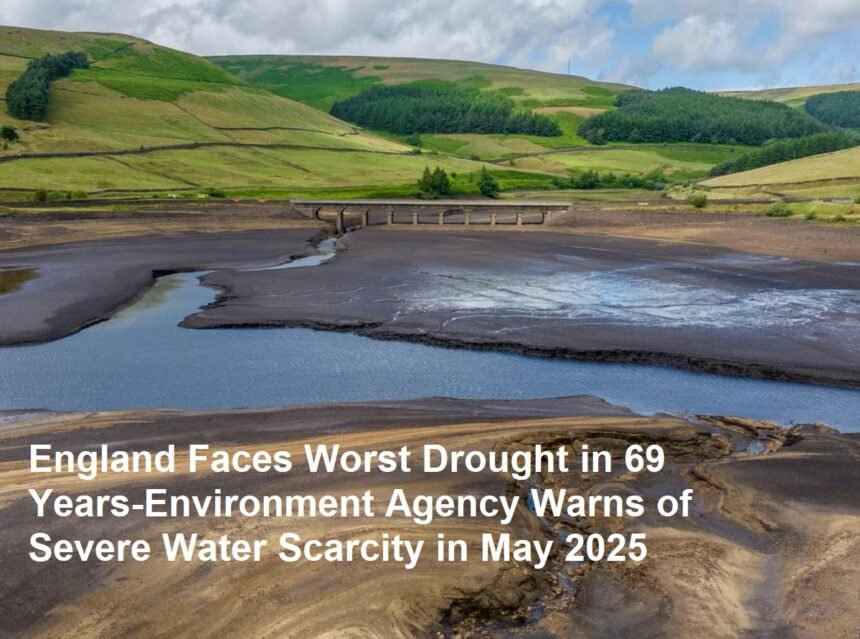On Tuesday, May 13, 2025, the Environment Agency of England issued a stark warning that the country is experiencing its worst drought in 69 years, dating back to May 1961. This announcement highlights a severe and prolonged period of water scarcity that is affecting large parts of England, with significant implications for the environment, agriculture, industry, and everyday life for millions of people.
Droughts are extended periods of below-average rainfall that lead to water shortages, impacting natural ecosystems and human activities. The current drought in England is particularly notable not only for its severity but also for its timing in May, a month typically associated with spring rains that help replenish water supplies after winter. The Environment Agency’s statement underscores that the rainfall levels recorded this year are the lowest since records began in 1961, marking an unprecedented challenge for water management in the region.
Several factors have contributed to this historic drought. Climate change plays a central role by altering weather patterns, increasing temperatures, and reducing the frequency and intensity of rainfall in some regions. Warmer temperatures accelerate evaporation rates from soil and water bodies, further depleting available moisture. Additionally, consecutive dry months and below-average precipitation have compounded the problem, leaving reservoirs, rivers, and groundwater sources at critically low levels.
The impacts of this drought are wide-ranging and affect multiple sectors. For agriculture, water scarcity threatens crop yields and livestock health, as farmers struggle to irrigate fields and provide sufficient water for animals. Reduced soil moisture can lead to poor plant growth and increased vulnerability to pests and diseases. This, in turn, can affect food supply chains and prices, with potential economic consequences for farmers and consumers alike.
Natural ecosystems are also under stress. Rivers and wetlands may experience reduced flow and drying, endangering aquatic life and biodiversity. Fish populations, amphibians, and other wildlife that depend on stable water conditions face increased risks. Furthermore, dry conditions elevate the risk of wildfires, which can cause extensive damage to habitats and property.
For the general public, the drought has led to the implementation of water use restrictions in many areas. These measures may include bans on watering gardens, washing cars, or filling swimming pools, as well as urging households and businesses to conserve water wherever possible. Water companies are working to manage limited supplies and encourage responsible usage to prevent shortages.
The government and environmental agencies have been actively monitoring the situation and coordinating responses. Efforts include increasing public awareness about water conservation, investing in infrastructure to improve water storage and distribution, and exploring long-term strategies to enhance resilience against future droughts. These strategies may involve promoting sustainable water management practices, protecting natural water catchments, and supporting research into climate adaptation.
Historically, England has faced droughts before, but the current event stands out due to its intensity and the broader context of global climate change. The 1961 drought, which serves as a benchmark, was a significant event that led to widespread water shortages and prompted improvements in water management policies. Learning from past experiences, authorities are striving to mitigate the current crisis and prepare for similar challenges ahead.
Looking forward, experts warn that droughts may become more frequent and severe as climate change progresses. This reality calls for urgent action to reduce greenhouse gas emissions globally and to implement adaptive measures locally. Enhancing water efficiency, protecting natural ecosystems, and investing in innovative technologies such as water recycling and desalination could play vital roles in securing water supplies for the future.
In conclusion, the Environment Agency’s announcement on May 13, 2025, about England’s worst drought in nearly seven decades is a sobering reminder of the growing environmental challenges posed by changing climate conditions. The drought’s impacts on agriculture, ecosystems, and daily life highlight the critical importance of sustainable water management and collective efforts to conserve this precious resource. As England navigates this difficult period, cooperation among government bodies, businesses, communities, and individuals will be essential to mitigate the effects and build resilience against future droughts.









